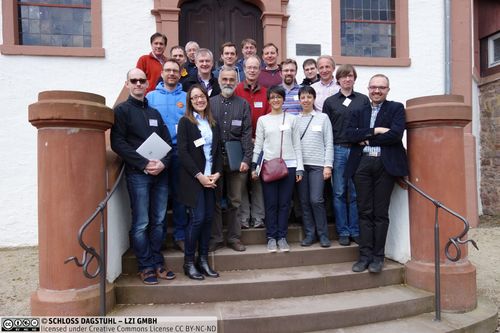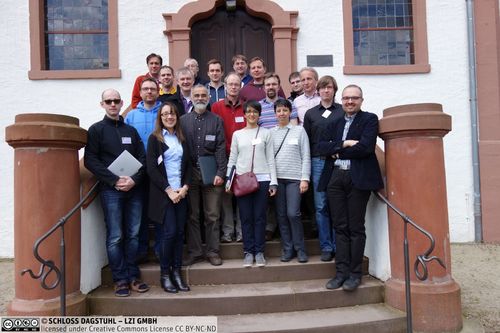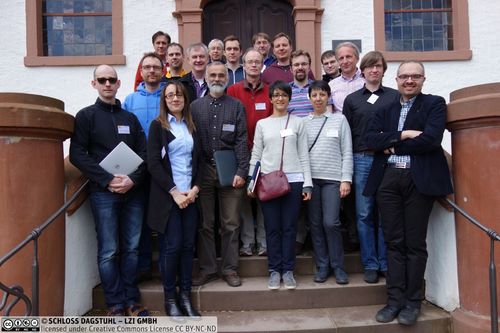Dagstuhl-Seminar 16172
Machine Learning for Dynamic Software Analysis: Potentials and Limits
( 24. Apr – 27. Apr, 2016 )
Permalink
Organisatoren
- Amel Bennaceur (The Open University - Milton Keynes, GB)
- Dimitra Giannakopoulou (NASA - Moffett Field, US)
- Reiner Hähnle (TU Darmstadt, DE)
- Karl Meinke (KTH Royal Institute of Technology - Stockholm, SE)
Kontakt
- Simone Schilke (für administrative Fragen)
Programm
Machine learning of software artifacts is an emerging area of interaction between the machine learning (ML) and software analysis (SA) communities. Increased productivity in software engineering hinges on the creation of new adaptive, scalable tools that can analyse large and continuously changing software systems. For example: agile software development using continuous integration and delivery can require new documentation models, static analyses, proofs and tests of millions of lines of code every 24 hours. These needs are being addressed by new SA techniques based on machine learning, such as learning-based software testing, invariant generation or code synthesis.
Machine learning is a powerful paradigm for SA that provides novel approaches to automating the generation of models and other essential artifacts. However, the ML and SA communities are traditionally separate, each with its own agenda. This Dagstuhl Seminar aims to bring together top researchers active in these two fields who can present the state of the art, and suggest new directions and collaborations for future research. We, the organisers, feel strongly that both communities have much to learn from each other, and the seminar will focus strongly on fostering a spirit of collaboration.
The three day program consists of an introductory day of overview talks by experts from the software analysis and machine learning communities. The aim is to outline the field and establish a scope and common framework. These will be followed on subsequent days by more specialist presentations and discussions. These specialist presentations and discussions will be organized into four themes:
- machine learning for model extraction,
- learning-based software testing,
- machine learning for systems integration, and
- applications of machine learning in non-traditional areas of software engineering.
There will also be an opportunity for tool demonstrations.
Machine learning of software artefacts is an emerging area of interaction between the machine learning (ML) and software analysis (SA) communities. Increased productivity in software engineering hinges on the creation of new adaptive, scalable tools that can analyse large and continuously changing software systems. For example: agile software development using continuous integration and delivery can require new documentation models, static analyses, proofs and tests of millions of lines of code every 24 hours. These needs are being addressed by new SA techniques based on machine learning, such as learning-based software testing, invariant generation or code synthesis.
Machine learning is a powerful paradigm for SA that provides novel approaches to automating the generation of models and other essential artefacts. However, the ML and SA communities are traditionally separate, each with its own agenda. This Dagstuhl Seminar brought together top researchers active in these two fields who can present the state of the art, and suggest new directions and collaborations for future research. We, the organisers, feel strongly that both communities have much to learn from each other, and the seminar focused strongly on fostering a spirit of collaboration.
The first day was dedicated to mutual education through a series of tutorials by leading researchers in both ML and SA to familiarise everyone with the terminology, research methodologies, and main approach of each community. The second day was dedicated to brainstorming and focused discussion in small groups, each of which supported by one of the organisers acting as a facilitator. At the end of the day a plenary session was held for each group to share a summary of their discussions. The participants also reflected and compared their findings. The morning of the third day was dedicated to the integration of the groups and further planning.
This report presents an overview of the talks given at the seminar and summaries of the discussions of the participants.
Aknowledgements
The organisers would like to express their gratitude to the participants and the Schloss Dagstuhl team for a productive and exciting seminar.
 Amel Bennaceur, Dimitra Giannakopoulou, Reiner Hähnle, and Karl Meinke
Amel Bennaceur, Dimitra Giannakopoulou, Reiner Hähnle, and Karl Meinke
- Andreas Abel (Universität des Saarlandes - Saarbrücken, DE) [dblp]
- Dalal Alrajeh (Imperial College London, GB) [dblp]
- Amel Bennaceur (The Open University - Milton Keynes, GB) [dblp]
- Pavol Bielik (ETH Zürich, CH) [dblp]
- Radu Grosu (TU Wien, AT) [dblp]
- Roland Groz (LIG - Grenoble, FR) [dblp]
- Reiner Hähnle (TU Darmstadt, DE) [dblp]
- Falk Howar (IPSSE - Goslar, DE) [dblp]
- Bengt Jonsson (Uppsala University, SE) [dblp]
- Karl Meinke (KTH Royal Institute of Technology - Stockholm, SE) [dblp]
- Mohammad Reza Mousavi (Halmstad University, SE) [dblp]
- Daniel Neider (Los Angeles, US) [dblp]
- Zvonimir Rakamaric (University of Utah - Salt Lake City, US) [dblp]
- Alessandra Russo (Imperial College London, GB) [dblp]
- Bernhard Steffen (TU Dortmund, DE) [dblp]
- Frits Vaandrager (Radboud University Nijmegen, NL) [dblp]
- Sicco Verwer (TU Delft, NL) [dblp]
- Neil Walkinshaw (University of Leicester, GB) [dblp]
- Andrzej Wasowski (IT University of Copenhagen, DK) [dblp]
Klassifikation
- artificial intelligence / robotics
- semantics / formal methods
- software engineering
Schlagworte
- software analysis
- machine learning
- dynamic analysis
- testing
- automata learning




 Creative Commons BY 3.0 Unported license
Creative Commons BY 3.0 Unported license
